外研版九年级下册Module 8 My future lifeModule 8 Unit 3 Revision课件(共27张PPT,内嵌音频)
文档属性
| 名称 | 外研版九年级下册Module 8 My future lifeModule 8 Unit 3 Revision课件(共27张PPT,内嵌音频) |
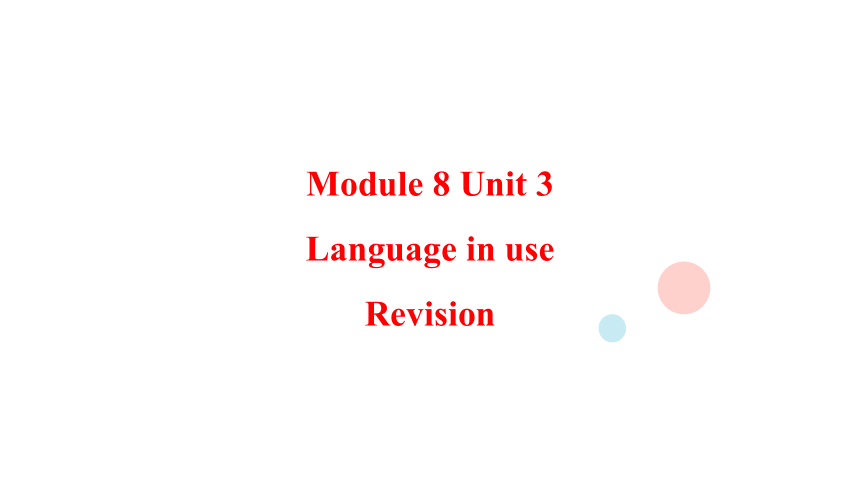
|
|
| 格式 | pptx | ||
| 文件大小 | 4.2MB | ||
| 资源类型 | 教案 | ||
| 版本资源 | 外研版 | ||
| 科目 | 英语 | ||
| 更新时间 | 2025-04-27 20:36:50 | ||
图片预览

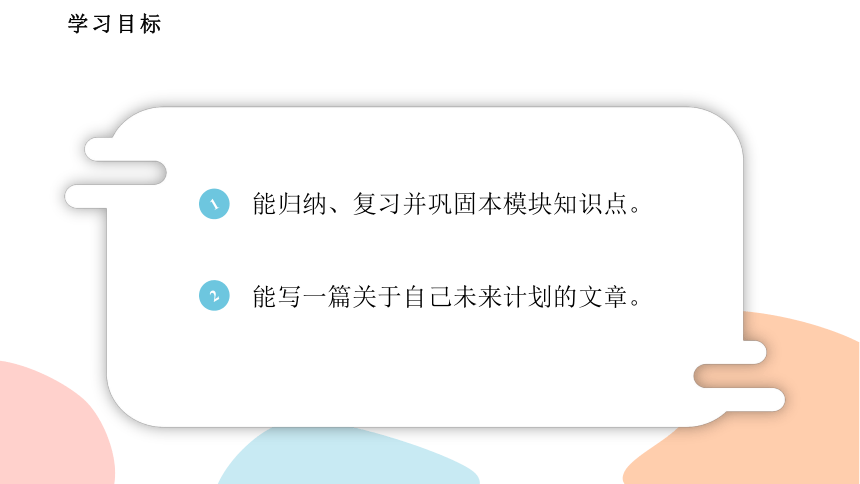
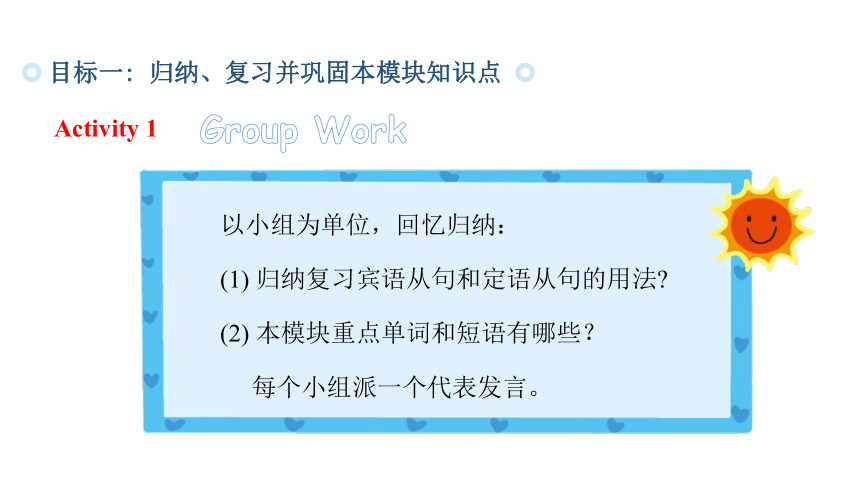
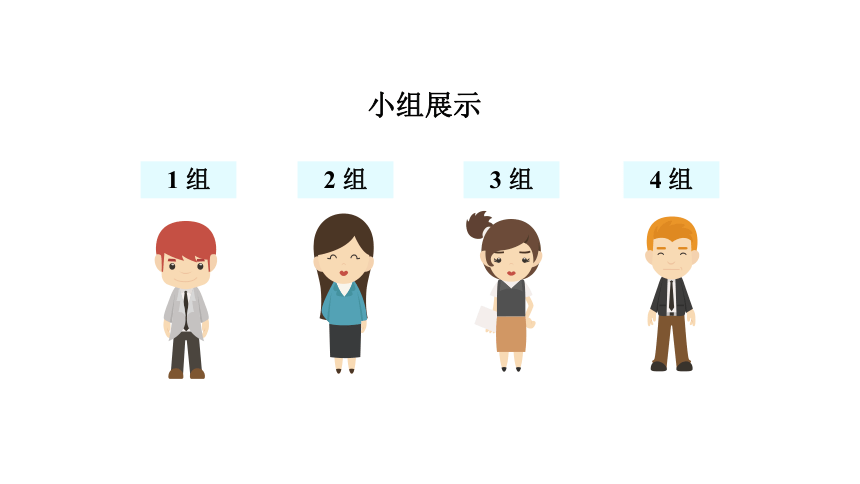
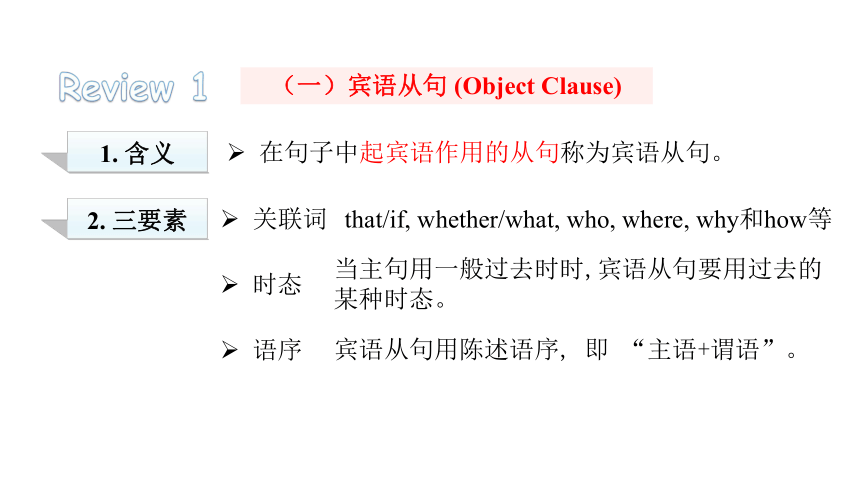

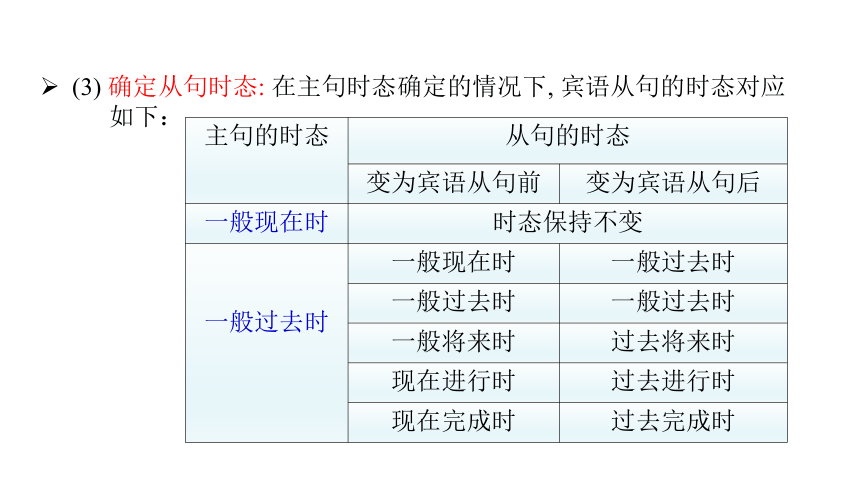
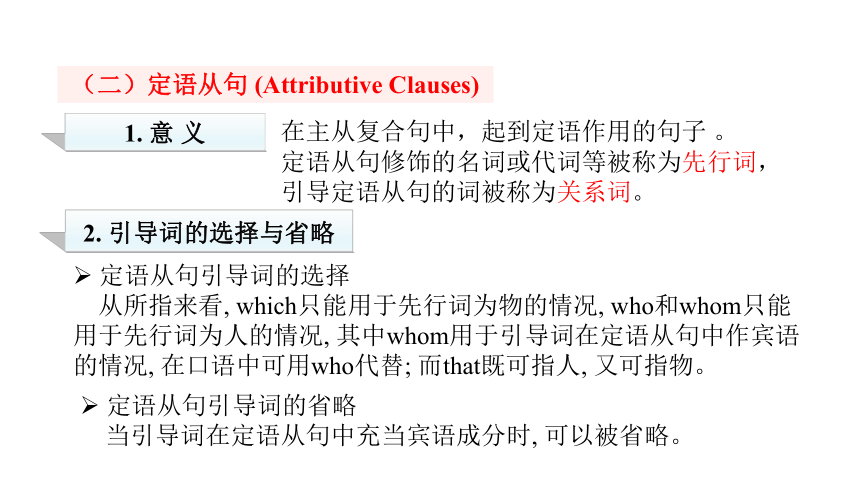
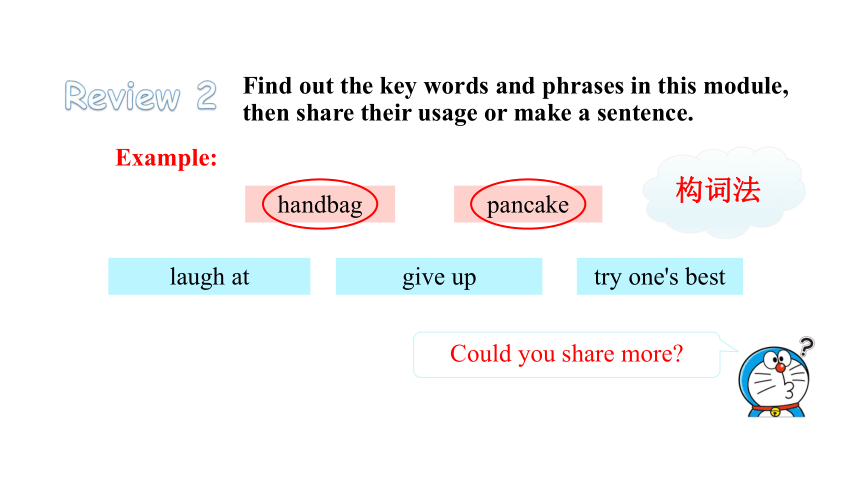
文档简介
(共27张PPT)
Module 8 Unit 3
Language in use
Revision
1
2
能写一篇关于自己未来计划的文章。
能归纳、复习并巩固本模块知识点。
目标一: 归纳、复习并巩固本模块知识点
Activity 1
Group Work
以小组为单位,回忆归纳:
(1) 归纳复习宾语从句和定语从句的用法
(2) 本模块重点单词和短语有哪些?
每个小组派一个代表发言。
1 组
2 组
3 组
4 组
小组展示
Review 1
1. 含义
(一)宾语从句 (Object Clause)
2. 三要素
在句子中起宾语作用的从句称为宾语从句。
关联词
时态
语序
that/if, whether/what, who, where, why和how等
当主句用一般过去时时,宾语从句要用过去的某种时态。
宾语从句用陈述语序, 即 “主语+谓语”。
3. 变宾语从句的三个关键点:
(1)确定从句的引导词: 宾语从句的引导词要根据从句句式来确定,
其对应情况如下表:
从句句式 引导词
陈述句 that
一般疑问句 if 或whether
特殊疑问句 特殊疑问词
(2)确保从句语序正确:无论原句是何种句式, 宾语从句要用陈述语序。
(3) 确定从句时态: 在主句时态确定的情况下, 宾语从句的时态对应
如下:
主句的时态 从句的时态 变为宾语从句前 变为宾语从句后
一般现在时 时态保持不变 一般过去时 一般现在时 一般过去时
一般过去时 一般过去时
一般将来时 过去将来时
现在进行时 过去进行时
现在完成时 过去完成时
(二)定语从句 (Attributive Clauses)
1. 意 义
在主从复合句中,起到定语作用的句子 。
定语从句修饰的名词或代词等被称为先行词,引导定语从句的词被称为关系词。
2. 引导词的选择与省略
定语从句引导词的选择
从所指来看, which只能用于先行词为物的情况, who和whom只能用于先行词为人的情况, 其中whom用于引导词在定语从句中作宾语的情况, 在口语中可用who代替; 而that既可指人, 又可指物。
定语从句引导词的省略
当引导词在定语从句中充当宾语成分时, 可以被省略。
Find out the key words and phrases in this module, then share their usage or make a sentence.
Review 2
Could you share more
handbag
laugh at
try one's best
pancake
Example:
give up
构词法
英语的构词法主要有两种, 一种是合成, 一种是派生。
构 词 法
(一) 合成法:指由两个或多个单词合成一个新词的方法。
有合成名词bathroom; 合成形容词 middle-aged;
合成代词 himself
(二) 派生法:派生是通过一个单词(词根)加前缀或后缀
构成新词的方法。
uncomfortable
词
根
前缀
后缀
常用的前缀
和后缀有哪些
① 常用前缀
前缀 含义 例 词
en- 使可能 enable 使能够, enrich使富裕
ir-,in- 不,非 inexpensive不贵的, irregular不规则的
im- 不 impossible 不可能的, impatient不耐心的
mis- 错误的 misunderstanding误解 , mistake错误
non- 不,非 non-smoker不吸烟者, non-swimmer不会游泳者
un- 不 unable 无能的, unhappy不高兴的
re- 再,重复 rewrite 重写, retell复述
tele- 远程 television电视, telephone电话
② 常用后缀
词类 后缀 例 词
名词 -er,-or teacher, worker, inventor , visitor
-ian musician
-ment government, judgment
形容词 -full careful, helpful, useful
-less careless, homeless, helpless, useless
-able comfortable, probable , usable , eatable
数词 -teen seventeen, eighteen, fifteen
-th fifth, seventh, fifteenth, fortieth
-ty forty, sixty, twenty
副词 -ly carefully, carelessly, happily, badly, quickly
Activity 2
Join the words in Box A with the words in Box B to make new words. You need to use one word more than once.
4
after class hair hand
A
bag cut make mate noon
B
afternoon classmate haircut handbag handmade
Now complete the conversation with the new words. (L=Lingling; B=Betty)
L:What are you going to wear to the school-leavers' party
B:I'm going to wear a dress. And I'm going to buy a new black (1)_________. Do you want to go with me to the shopping centre to look for one
L:Sorry, I can't. I'm having a(n)(2)_______ this (3)_________ at three o'clock. I want nice short hair for the party!
T:I'll go with you, Betty. I'm going to take photos, and I want to buy a book to put the photos in. I hope that all of us will remember each other. I'm happy I have been your (4) __________.
B:I've already bought a special book for the photos. It's black, with (5) _________ paper pages.
T:You can carry it on the big night, then. It'll match your clothes.
B:Don't be silly, Tony!
handbag
haircut
afternoon
handmade
classmate
afternoon
classmate
haircut
handbag
handmade
Complete the sentences with the words or expressions in the box.
5
beat laugh at pardon roses wake... up
1. Try to follow the ______ of the music.
2. Oh, _______ me. I didn't see you there.
3. We're going to put _____ all around the room this year.
4. I can't go to school wearing that — everyone will _______ me.
5. I'll _____ you ___ when it's time to leave.
beat
pardon
roses
laugh at
wake up
Free Talk
Activity 3
How many days are left before you leave school Do you have any dream or plan for the future What will you do to make your dream come true
Listen and read carefully, then finish the tasks.
Task 1 Listen and answer the questions.
6
1. Did Adam go to Africa or America
2. What did Adam do there
3. What does Adam like most about the country
4. What did Adam do at weekends
5. What does Adam want to do in the future
Adam went to Africa.
He helped to build a primary school.
The people were very friendly.
He visited the beach.
He wants to go to college and become a teacher.
Task 2 Listen again and check your answers. (P=Presenter; A=Adam;)
P: Adam is in the studio with us, and he's going to tell us about his year between the end of school and the start of university. Adam, tell us where you went, and what you did there.
A: I went to Ghana, in Africa. Our main project was building a primary school, because there wasn't a school in the village, and the children were studying outside.
P: Was the experience everything you expected
A: Yes, in fact it was more than I expected. I felt very proud to be part of the project. We were helping children to have a good education.
P: What was your favourite thing about Ghana
A: The people are very friendly. My friendship with some of them will last forever. I'm sure of that.
P: How did you spend your free time
A: At weekends, we visited the beaches. The beaches were lovely, and most of the time empty too. Very relaxing.
P: What did you miss most while you were away
A: I missed my friends and family most.
P: Have you found what you want to do with the rest of your life
A: The answer is no, but I have discovered what I don't want to do! I thought I wanted to be an actor. Now I know that I want to help people. I've decided to go to college and maybe become a teacher in the future.
P: So your experience really did change your life!
A: Yes, it did!
7
Task 3 Listen a passage and answer.
1. What is a vocational school
2. What does Mark Smith learn now
A school where people learn how to do many
of the jobs that are needed in modern society.
How to repair machines.
Task 4 Listen and choose the correct answer:
1. What do students at vocational schools do
a) They look for jobs there. b) They learn how to do many of the jobs that are needed in society.
c) They study why the jobs are needed in society.
d) They do the same as students in secondary school.
2. Why did Mark choose to go to vocational school
a) Because he wanted to know more about society. b) Because he finished secondary school.
c) Because he found that he was better at doing things than at reading books.
d) Because he did not do well at school.
3. According to the passage, which of the following is NOT the reason why Mark made his
choice
a) Everyone needs a skill for a good life in the future.
b) He can study the things that he likes best.
c) The society needs not just people who work in an office, but also those who can make
things and repair things. d) He likes physics.
Task 5 Find attributive clauses and object clauses from the passage.
目标二:能写一篇关于自己未来计划的文章
Module Task: Making plans for your future
Step 1: Think about your life in the future. Make notes
about the following things:
what you are planning to do in the next three years
what you would like to do after that
what other areas of your life you want to develop
what sort of values you think will be important to you
Step 2: Use your notes to write sentences.
Step 3: Join your sentences and write a passage about
your future plan.
My future life
I am leaving junior high school soon and I have a plan for my future. I want to go to a better senior high school and get special training. I like English and I am also good at English, so I want to be better at English and I plan to specialize in English for science and technology. I want to be skilled in it and make it my career.
I hope I could translate some articles of science and technology. I want to be a knowledgeable person and I want to make my life fruitful.
What have you learned in Module 8
Around the world
Junior high school dances
In the US, students often have a school dance to celebrate the end of junior high. There is usually a student committee which organises the dance. They decorate the school gym with balloons, lights and other things so that it looks very nice. They plan the music and organise the food. Sometimes the parents help make the food and sometimes it comes from a restaurant. The girls usually wear pretty dresses and the boys wear smart clothes. They eat, dance and sometimes have competitions. The dance is usually supervised by teachers and parents.
Module 8 Unit 3
Language in use
Revision
1
2
能写一篇关于自己未来计划的文章。
能归纳、复习并巩固本模块知识点。
目标一: 归纳、复习并巩固本模块知识点
Activity 1
Group Work
以小组为单位,回忆归纳:
(1) 归纳复习宾语从句和定语从句的用法
(2) 本模块重点单词和短语有哪些?
每个小组派一个代表发言。
1 组
2 组
3 组
4 组
小组展示
Review 1
1. 含义
(一)宾语从句 (Object Clause)
2. 三要素
在句子中起宾语作用的从句称为宾语从句。
关联词
时态
语序
that/if, whether/what, who, where, why和how等
当主句用一般过去时时,宾语从句要用过去的某种时态。
宾语从句用陈述语序, 即 “主语+谓语”。
3. 变宾语从句的三个关键点:
(1)确定从句的引导词: 宾语从句的引导词要根据从句句式来确定,
其对应情况如下表:
从句句式 引导词
陈述句 that
一般疑问句 if 或whether
特殊疑问句 特殊疑问词
(2)确保从句语序正确:无论原句是何种句式, 宾语从句要用陈述语序。
(3) 确定从句时态: 在主句时态确定的情况下, 宾语从句的时态对应
如下:
主句的时态 从句的时态 变为宾语从句前 变为宾语从句后
一般现在时 时态保持不变 一般过去时 一般现在时 一般过去时
一般过去时 一般过去时
一般将来时 过去将来时
现在进行时 过去进行时
现在完成时 过去完成时
(二)定语从句 (Attributive Clauses)
1. 意 义
在主从复合句中,起到定语作用的句子 。
定语从句修饰的名词或代词等被称为先行词,引导定语从句的词被称为关系词。
2. 引导词的选择与省略
定语从句引导词的选择
从所指来看, which只能用于先行词为物的情况, who和whom只能用于先行词为人的情况, 其中whom用于引导词在定语从句中作宾语的情况, 在口语中可用who代替; 而that既可指人, 又可指物。
定语从句引导词的省略
当引导词在定语从句中充当宾语成分时, 可以被省略。
Find out the key words and phrases in this module, then share their usage or make a sentence.
Review 2
Could you share more
handbag
laugh at
try one's best
pancake
Example:
give up
构词法
英语的构词法主要有两种, 一种是合成, 一种是派生。
构 词 法
(一) 合成法:指由两个或多个单词合成一个新词的方法。
有合成名词bathroom; 合成形容词 middle-aged;
合成代词 himself
(二) 派生法:派生是通过一个单词(词根)加前缀或后缀
构成新词的方法。
uncomfortable
词
根
前缀
后缀
常用的前缀
和后缀有哪些
① 常用前缀
前缀 含义 例 词
en- 使可能 enable 使能够, enrich使富裕
ir-,in- 不,非 inexpensive不贵的, irregular不规则的
im- 不 impossible 不可能的, impatient不耐心的
mis- 错误的 misunderstanding误解 , mistake错误
non- 不,非 non-smoker不吸烟者, non-swimmer不会游泳者
un- 不 unable 无能的, unhappy不高兴的
re- 再,重复 rewrite 重写, retell复述
tele- 远程 television电视, telephone电话
② 常用后缀
词类 后缀 例 词
名词 -er,-or teacher, worker, inventor , visitor
-ian musician
-ment government, judgment
形容词 -full careful, helpful, useful
-less careless, homeless, helpless, useless
-able comfortable, probable , usable , eatable
数词 -teen seventeen, eighteen, fifteen
-th fifth, seventh, fifteenth, fortieth
-ty forty, sixty, twenty
副词 -ly carefully, carelessly, happily, badly, quickly
Activity 2
Join the words in Box A with the words in Box B to make new words. You need to use one word more than once.
4
after class hair hand
A
bag cut make mate noon
B
afternoon classmate haircut handbag handmade
Now complete the conversation with the new words. (L=Lingling; B=Betty)
L:What are you going to wear to the school-leavers' party
B:I'm going to wear a dress. And I'm going to buy a new black (1)_________. Do you want to go with me to the shopping centre to look for one
L:Sorry, I can't. I'm having a(n)(2)_______ this (3)_________ at three o'clock. I want nice short hair for the party!
T:I'll go with you, Betty. I'm going to take photos, and I want to buy a book to put the photos in. I hope that all of us will remember each other. I'm happy I have been your (4) __________.
B:I've already bought a special book for the photos. It's black, with (5) _________ paper pages.
T:You can carry it on the big night, then. It'll match your clothes.
B:Don't be silly, Tony!
handbag
haircut
afternoon
handmade
classmate
afternoon
classmate
haircut
handbag
handmade
Complete the sentences with the words or expressions in the box.
5
beat laugh at pardon roses wake... up
1. Try to follow the ______ of the music.
2. Oh, _______ me. I didn't see you there.
3. We're going to put _____ all around the room this year.
4. I can't go to school wearing that — everyone will _______ me.
5. I'll _____ you ___ when it's time to leave.
beat
pardon
roses
laugh at
wake up
Free Talk
Activity 3
How many days are left before you leave school Do you have any dream or plan for the future What will you do to make your dream come true
Listen and read carefully, then finish the tasks.
Task 1 Listen and answer the questions.
6
1. Did Adam go to Africa or America
2. What did Adam do there
3. What does Adam like most about the country
4. What did Adam do at weekends
5. What does Adam want to do in the future
Adam went to Africa.
He helped to build a primary school.
The people were very friendly.
He visited the beach.
He wants to go to college and become a teacher.
Task 2 Listen again and check your answers. (P=Presenter; A=Adam;)
P: Adam is in the studio with us, and he's going to tell us about his year between the end of school and the start of university. Adam, tell us where you went, and what you did there.
A: I went to Ghana, in Africa. Our main project was building a primary school, because there wasn't a school in the village, and the children were studying outside.
P: Was the experience everything you expected
A: Yes, in fact it was more than I expected. I felt very proud to be part of the project. We were helping children to have a good education.
P: What was your favourite thing about Ghana
A: The people are very friendly. My friendship with some of them will last forever. I'm sure of that.
P: How did you spend your free time
A: At weekends, we visited the beaches. The beaches were lovely, and most of the time empty too. Very relaxing.
P: What did you miss most while you were away
A: I missed my friends and family most.
P: Have you found what you want to do with the rest of your life
A: The answer is no, but I have discovered what I don't want to do! I thought I wanted to be an actor. Now I know that I want to help people. I've decided to go to college and maybe become a teacher in the future.
P: So your experience really did change your life!
A: Yes, it did!
7
Task 3 Listen a passage and answer.
1. What is a vocational school
2. What does Mark Smith learn now
A school where people learn how to do many
of the jobs that are needed in modern society.
How to repair machines.
Task 4 Listen and choose the correct answer:
1. What do students at vocational schools do
a) They look for jobs there. b) They learn how to do many of the jobs that are needed in society.
c) They study why the jobs are needed in society.
d) They do the same as students in secondary school.
2. Why did Mark choose to go to vocational school
a) Because he wanted to know more about society. b) Because he finished secondary school.
c) Because he found that he was better at doing things than at reading books.
d) Because he did not do well at school.
3. According to the passage, which of the following is NOT the reason why Mark made his
choice
a) Everyone needs a skill for a good life in the future.
b) He can study the things that he likes best.
c) The society needs not just people who work in an office, but also those who can make
things and repair things. d) He likes physics.
Task 5 Find attributive clauses and object clauses from the passage.
目标二:能写一篇关于自己未来计划的文章
Module Task: Making plans for your future
Step 1: Think about your life in the future. Make notes
about the following things:
what you are planning to do in the next three years
what you would like to do after that
what other areas of your life you want to develop
what sort of values you think will be important to you
Step 2: Use your notes to write sentences.
Step 3: Join your sentences and write a passage about
your future plan.
My future life
I am leaving junior high school soon and I have a plan for my future. I want to go to a better senior high school and get special training. I like English and I am also good at English, so I want to be better at English and I plan to specialize in English for science and technology. I want to be skilled in it and make it my career.
I hope I could translate some articles of science and technology. I want to be a knowledgeable person and I want to make my life fruitful.
What have you learned in Module 8
Around the world
Junior high school dances
In the US, students often have a school dance to celebrate the end of junior high. There is usually a student committee which organises the dance. They decorate the school gym with balloons, lights and other things so that it looks very nice. They plan the music and organise the food. Sometimes the parents help make the food and sometimes it comes from a restaurant. The girls usually wear pretty dresses and the boys wear smart clothes. They eat, dance and sometimes have competitions. The dance is usually supervised by teachers and parents.
同课章节目录
- Module 1 Travel
- Unit 1 We toured the city by bus and by taxi
- Unit 2 It's a long story.
- Unit 3 Language in use
- Module 2 Education
- Unit 1 They don't sit in rows.
- Unit 2 What do I like best about school?
- Unit 3 Language in use
- Module 3 Life now and then
- Unit 1 They sometimes work harder.
- Unit 2 I think life is better today.
- Unit 3 Language in use.
- Module 4 Rules and suggestions
- Unit 1 You must be careful of falling stones.
- Unit 2 we must keep the camp clean.
- Unit 3 Language in use.
- Revison A
- Module 5 Look after yourself
- Unit 1 We'd better get you to hospital.
- Unit 2 Get off the sofa!
- Unit 3 Language in use.
- Module 6 Eating togethe
- Unit 1 When is the school-leavers' party?
- Unit 2 Knives and forks are used for most Western
- Unit 3 Language in use
- Module 7 English for you and me
- Unit 1 Have you ever been to an English corner?
- Unit 2 We all own English.
- Unit 3 Language in use
- Module 8 My future life
- Unit 1 Here's to our friendship and the future
- Unit 2 I know that you will be better at maths.
- Unit 3 Language in use
- Revison B
